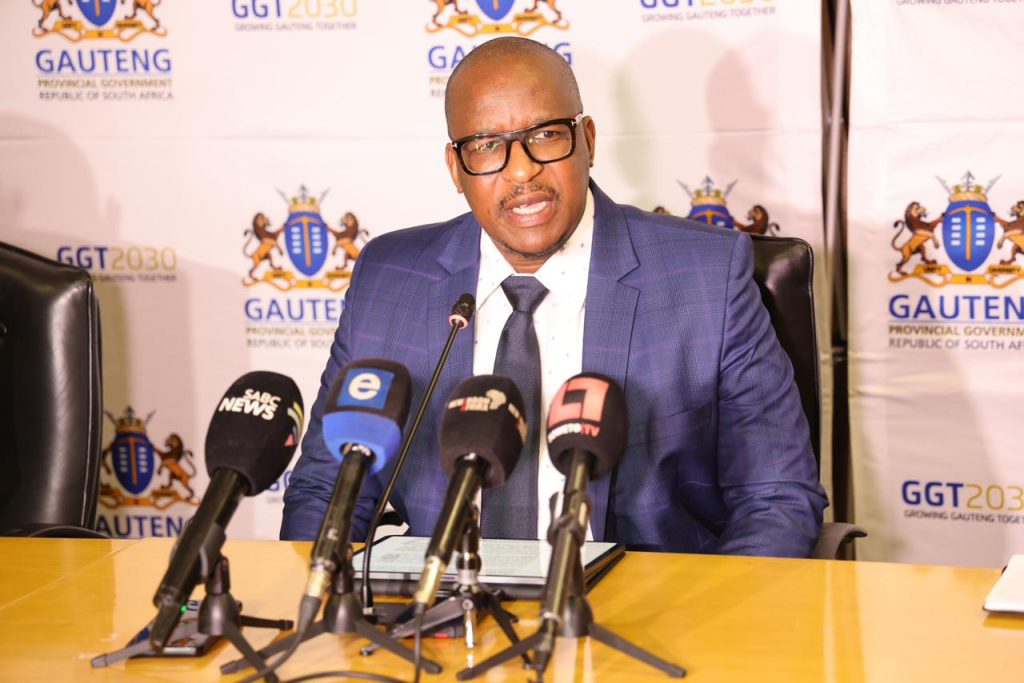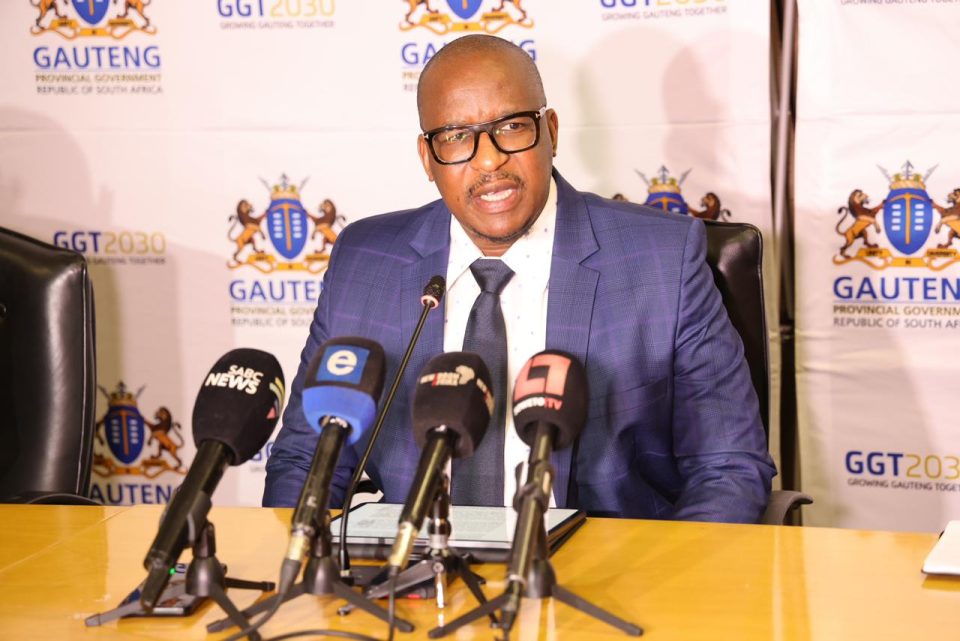
Nie Cele
Meticulous and service driven Gauteng Department of Education is serious about total intervening in a life activity of a child with an aim of bringing him or her to proper adulthood.
Furthermore this 29 year old department has a knack to bring about change and educational innovations in the education corridors in the province to improve the lives of learners.
In a historic first, This is one department since 1994 that once achieved 44,46% bachelor passes in 2019.
Gauteng also contributed the highest number of matrics who qualified for bachelors studies in 2019-43 494 students qualified in total.
At the time, the then Education MEC, Panyaza Lesufi said the results of the National Senior Certificate indicated a maturing education system.
BACK TO THE STORY!!! This department recently tabled its 2023/2024 financial year priorities at Gauteng Provincial Legislature followed by a Media Briefing where they shed more light about their most pressing matters and matters of the department’s importance.
At first it was revealed, the department was allocated an earth-shattering R63.4 billion to advance its mandate of providing quality and easily accessible education in the province.
FASTFORWARD!!! In the driving seat is MEC Matome Chiloane who was appointed by Premier Panyaza Lesufi to take the department to greater heights.

READ BELOW UNEDITED PARTIALLY SUMMARISED STATEMENT HE PRESENTED TO THE MEDIA.
This is an increase of 6.2% from the 2022/23 budget of R59.7 billion, which essentially reflects an addition of R3.6 billion to the current budget. Before expanding on the Department’s priorities in accordance to this budget, it is imperative to note that 28 May 2023 – 4 June 2023 marks Child Protection Week which highlights the importance of building strong and supportive communities that prioritise the safety and well-being of all children.
Recently we mourned the disheartening death of a diligent matriculant by the name of Palesa Malatji, a 17-year-old learner from Ntsako Secondary School in Soshanguve who was brutally raped and murdered on Thursday, 25 May 2023.
The Department has noted more senseless and barbaric acts and behaviours that threaten the safety and future of our learners in the province.
Therefore, School Safety is one of the 6th administration’s elevated priorities for education and, as such, the Department will invest R2.91 billion into creating safer schools that embody Social Cohesion through, patriotism and non-violence through the heightened presence of safety patrollers.
The Department will channel a majority of this investment towards to the School Safety Strategy, which involves internal and external teams that provide integrated support in profiling, diagnosing, and identifying interventions to make schools a safer place for both staff and learners.
The school safety strategy is targeting 1700 Township schools and focusing on 275 High Risk Schools. In collaboration with the Department of Community Safety, CPF and SAPS we are implementing a School Safety Patroller programme across which will enlist 5000+ patrollers to provide security to schools on a 24-hour basis.
In addition to this, and in commemoration of Child Protection Week, the Department will be running a School Safety Week from 31 May 2023 throughout the month of June under the theme: Join us – let us protect Gauteng children beyond COVID-19.
This will be to rally Gauteng communities and schools through the Department’s various interventions 2 aimed at the protection of learners and staff alike.
The programme is attached at the end of this statement. Communities and learners are also urged to call the Childline Hotline Number by dialing 116 to report and receive assistance with any instance of child abuse.
We recently gathered over 2 000 school principals from across the province to engage further on the strategy of changing the educational landscape to accelerate relevant and quality learning, which we are investing R5.9 billion.
Among the apex points of this strategy is infrastructure to provide a more conducive environment for quality learning and teaching to take place.
We have plans to build 17 new schools in high pressured communities. With support from the Gauteng Infrastructure Financing Agency (GIFA), we applied for funding from the Budget Facility for Infrastructure (BFI) for the construction of 18 more schools, which was approved by National Treasury. In addition these, the Department urged principals to continue with the Self-Build Classrooms programme, which has been successful in addressing backlog in infrastructure delivery.
The programme is run with schools that is able to manage its own construction projects to increase capacity where needed. Furthermore, the Department’s investment in skills of the future will be enhanced through this investment within the strategy by advancing access to relevant curriculum offerings through establishing a total of 35 Schools of Specialisation, more Technical High Schools, and the introduction of the Multi-Certification Skills Programme across all schools.
The Multi Certification Skills Programme, in partnership with numerous experienced companies and accredited Sector Education and Training Authorities (SETA) aims to equip Grade 1-12 learners with skills not offered by the academic syllabus, including coding, robotics, rocketry, drone technology, sign language and more.
By the time the learners finish their schooling after 12 years, they will have a matric certificate plus 12 additional accredited skills-based certificates, and we start the programme from Grade 1. To ensure that this programme is experienced by all learners, the MCSP will focus on the following programmes:
• In the Foundation Phase (grades1-3), Swimming, Coding and Robotics
• In the InterSen Phases (grades 4-7), Entrepreneurship Education, Sign Language, Music Enhancements
• FET Phase, Technical Computer skills, Drones, Rocketry, First Aid Certification, Microsoft Digital Literacy, Welding, Plumbing, Basic Cad competency, Engineering and Graphic Design and K53.
To date over 100-Grade 11 learners commenced with the Multi-Certification skills programme in March 2023; Automotive -50 learners and Power Systems- 50 learners and 167-Grade 10 and 11 learners commenced with the Multi-Certification skills programme for Civil Services, and Construction.
It is clear that promoting quality education across all classrooms and schools remains a key priority for the Department, which an amount of R1.78 billion from the budget will be invested towards strengthening the foundation across all General Education and Training (GET) Grades.
We envision to invest in the improvement of the matric pass rate for Gauteng to 90% and the Bachelor Pass Rate to 50%, with specific emphasis in reducing 3 the difference in NSC Pass rate between township and ex-Model C schools to 7%.
Further emphasis will be placed on increasing learner participation in Mathematics and Science and ensuring that 21.5% of learners are achieving 60% and above in Physical Sciences and 17.5% of learners are achieving 60% and above in Mathematics.
Additional intervention programmes will be given in respect of all other Grades, which includes District support for all schools, monitoring the Curriculum and Assessment standards, access to e-content and Early Grade Reading Assessments (Grades 1-3).
The Introduction to African Languages and Maths, Science and Technology intervention programmes across all grades will be on going. R75.4 million will be spent on increasing access to Special Schools, capacity building of the educators, the procurement of appropriate learner-teacher support material and the screening of learners and a further R89,3 million will be spent on PsychoSocial support for Inclusive Education.
Early Childhood Development will receive an investment of R874 million. The Department will continue the expansion of Grade R to all public schools. In addition, pre-Grade R sites will be registered with Education Department to ensure that there is an adequate mix of public, private, and community-based pre-Grade R sites.
The GDE is in the process of building ECD of the Future centres. The first such centre is being built in Tshwane corridor – in Soshanguve. The Department is committed to rolling out ECDs of the future across the 5 corridors.
The majority of the Department’s is utilised towards the Compensation of Employees (CoE), which amounts to R46 billion. CoE budget increased by 8.8% showing a rand value increase of R3.7 billion, and it constitutes 72.6% of the total GDE budget. The 2023/24 Conditional Grant budget amounts to R3.2 billion and it will address numerous socio-economic and education related matters.
The Department’s Transfers and Subsidies budget increased from R7.8 billion in 2022/23 to R7.9 billion in 2023/24. The budget shows an increase of 1.1% which translate to a rand value of R85.1 million.
Apart from ensuring the remuneration of all staff and sustenance of all schools, the Department will strongly invest towards addressing the needs of Gauteng Youth through development programmes & increasing youth employability to a tune of R 3 billion.
This will be done through awarding of bursaries to the top 3 learners from No-fee schools and other priority areas, workplace and experiential learning to increase employability, career counselling and guidance, and developing Skills Programmes aligned to skills required by the 4th industrial revolution and transformation.


